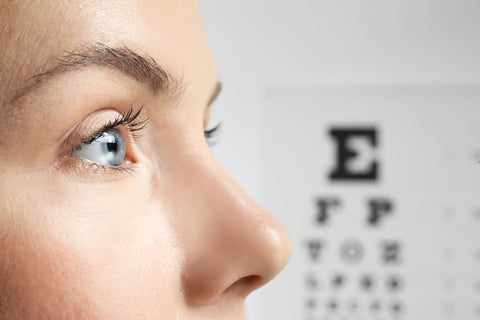Diabetic Eye Disease Month
Diabetic Eye Disease Month focuses attention on keeping our eyes healthy. Each November, vision care organizations, physicians, ophthalmologists, and opticians share resources on how diabetes can decrease your sight. According to the National Eye Institute, over 7 million Americans are impacted by diabetic retinopathy, a condition involving chronic high blood sugar that damages the retina's blood vessels. If you have diabetes, learn how to properly maintain your eyesight and schedule your annual eye exam.

How to Observe Diabetic Eye Disease Month
1. Get Tested For Diabetes
If you suspect you may have diabetes or you have unsettling eye disease symptoms, use this month as a way to conquer your anxiety and get proactive about your health. Various tests, including fasting or drinking a sugary, high glucose solution and then taking a blood test, will give you an accurate reading of the results. There are also certain factors during an eye exam that may indicate diabetes if you haven't been formally diagnosed.
2. Post An Eye Exam Reminder on Social Media
Use your platforms to save eyesight this month. Remind your friends and family that November is Diabetic Eye Disease Month. Put up some statistics and some links to organizations that are working on this issue.
3. Offer to Take Someone to Their Eye Exam
Being a friend includes being there for someone, even accompanying them to an eye exam. If your eyes are playing tricks on you, bring along a friend for support. If your eyes are dilated after the exam, you may need a ride home.

4 Reasons Why Diabetic Eye Disease Needs Attention
1. It Happens Gradually
Diabetic retinopathy often goes unnoticed until symptoms are so severe that you are at risk of completely losing your vision.
2. Diabetes Affects Many People
Diabetes is the leading cause of blindness, with 40-45 percent affected by diabetic retinopathy.
3. It Disproportionately Affects People of Color
Because people of different ethnic groups are prone to developing type 2 diabetes, they are also at a collectively higher risk for diabetic eye diseases.
4. You Can Fight It With a Healthy Lifestyle
Prevention is key because taking positive steps, such as watching what you eat, regular exercise, and correctly taking your diabetes medicine can prevent or even delay any vision loss.

Why Diabetic Eye Disease Month is Important
1. Diabetic Eye Disease Can Permanently Damage Your Vision
Think about all of the ways that you use your eyes, and think about how you would feel if you were to gradually lose your eyesight. Diabetic eye disease, also known as diabetic retinopathy, is a group of eye conditions affecting people with diabetes. These conditions include: cataracts, glaucoma, and macular swelling. The National Institute of Diabetes and Digestive and Kidney Diseases suggests seeing your doctor if you have blurry or frequently changing vision, experience dark areas or vision loss, or if you see floaters or flashes of light.
2. All Types of Diabetes Can Trigger Eye Disease
If you suffer with diabetes, you have a greater chance of having an eye disease than someone who doesn't. Every type of diabetes makes you vulnerable, which is why early detection with regular eye exams is key. People with type 1 and type 2 diabetes need annual exams. Pregnant women with both types 1 and 2 need exams prior to pregnancy or at least during the first trimester. Only expectant mothers with gestational diabetes aren't required to have eye exams because they can't develop diabetic eye disease during pregnancy.
3. Prevention Means Dilating Your Eyes
If you have diabetes, you need a more in-depth exam where the eye doctor dilates your eyes. This means that you will receive drops in your eyes to make the pupils larger. This allows the doctor to fully see the back of each eye including the retina, blood vessels, and optic nerve. After your eyes are dilated, don't panic if your vision is slightly blurry for a couple of hours, but be sure to arrange transportation.
Be sure to speak with your doctor or other qualified healthcare professional before stopping or starting any medication, taking any supplements, or beginning a new healthcare regimen.


